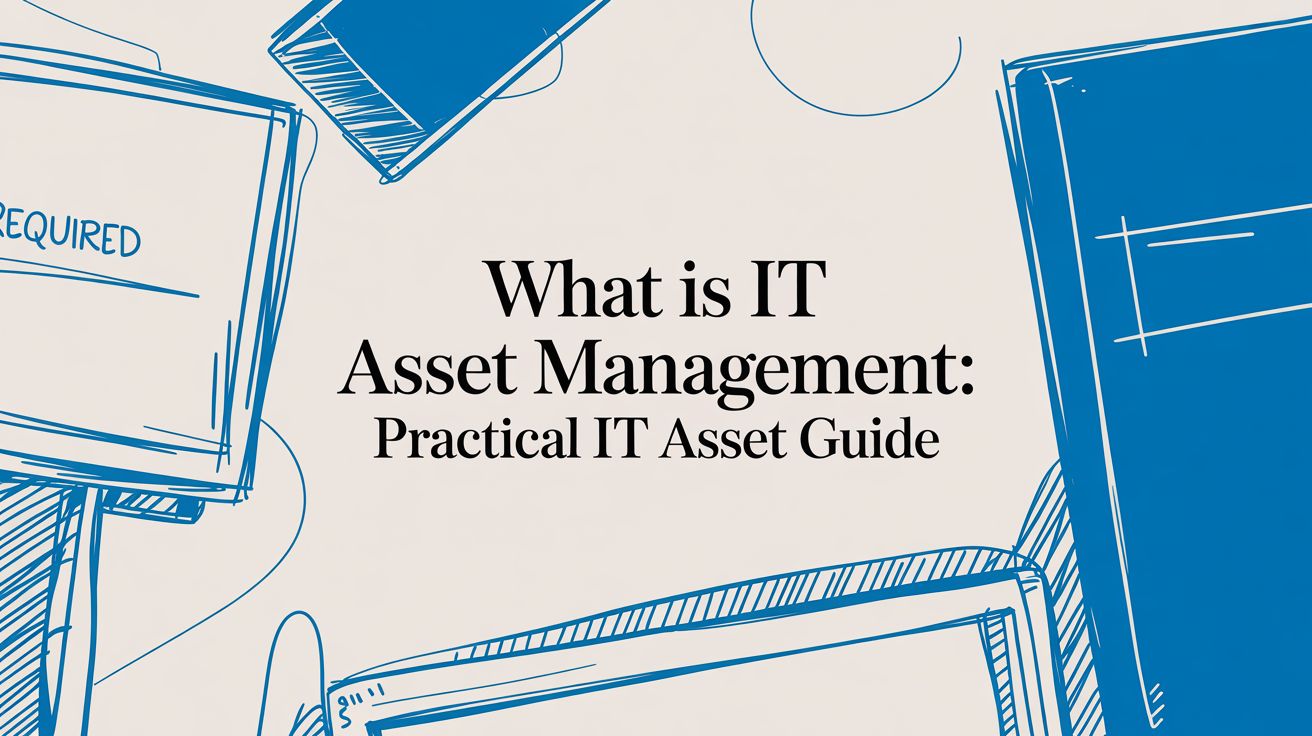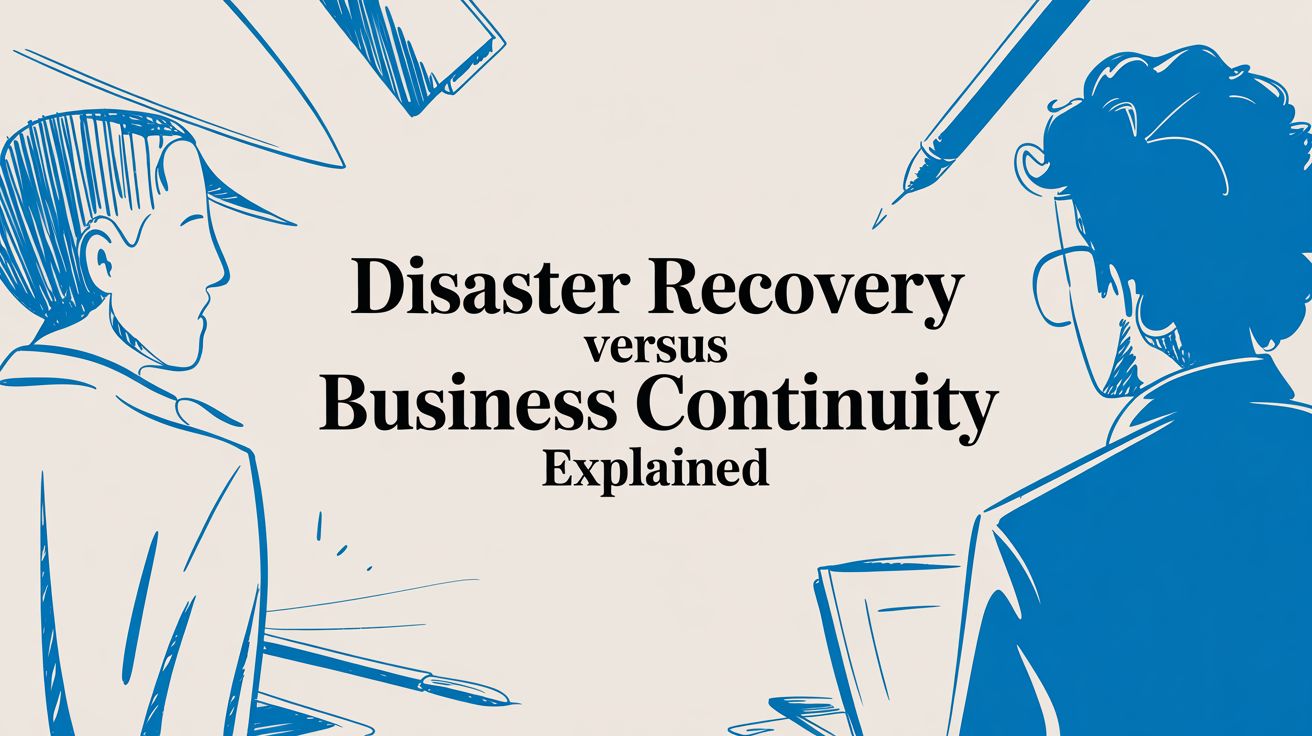Top Benefits of Outsourced IT Support for Your Business
For small and mid-sized businesses in competitive markets like Dallas and Memphis, technology is the engine for growth, not just a tool. However, managing IT in-house often becomes a constant battle against rising costs, complex cyber threats, and the relentless pace of innovation. From juggling daily helpdesk requests to planning for a major cloud migration, the demands can quickly overwhelm a small team. Many business owners find themselves pulled away from their core mission to firefight tech problems they are not equipped to solve.
This article explores the transformative benefits of outsourced IT support, explaining how partnering with a Managed Services Provider (MSP) can shift your IT from a reactive cost center to a proactive strategic asset. We'll dive into eight key advantages, supported by real-world scenarios and actionable insights that demonstrate how outsourcing can enhance security, ensure business continuity, and give you a powerful competitive edge. You will learn how this strategic move offers more than just troubleshooting; it provides a clear path to cost predictability, specialized expertise, and operational resilience.
1. Slash Costs with Predictable IT Budgeting
One of the most immediate and impactful benefits of outsourced IT support is transforming volatile technology expenses into a fixed, manageable monthly cost. This strategic shift moves IT spending from a reactive capital expenditure (CapEx) model to a predictable operational expenditure (OpEx) model, giving SMBs unprecedented financial control.
Instead of facing sudden bills for server failures, emergency repairs, or unexpected software licensing, you pay a consistent fee for comprehensive service. This fee covers everything from daily helpdesk support and proactive maintenance to cybersecurity monitoring, eliminating the hefty costs of hiring, training, and retaining an in-house IT team. The expenses of salaries, benefits, and continuous professional development for internal staff are rolled into one efficient, outsourced solution.
Practical Example: Law Firm Reduces IT Spend by 45%
A 50-person Dallas law firm, for example, previously struggled with an in-house IT generalist who couldn't keep up with cybersecurity demands or cloud management. After partnering with an MSP, they eliminated the internal salary and unpredictable project costs. This resulted in a 45% reduction in their annual IT spending—over $78,000 in savings—while gaining access to a full team of security and cloud experts, significantly improving their operational resilience.
The following chart visualizes the significant cost reductions and avoided expenses businesses often experience when partnering with a managed services provider.
This data clearly illustrates how outsourcing converts large, unpredictable capital outlays and high fixed payrolls into streamlined, cost-effective operational expenses.
Actionable Tip: Maximize Your IT Budget
To ensure you get the most value from your investment, take these proactive steps:
- Compare Total Cost of Ownership (TCO): Look beyond the monthly fee. Analyze the TCO over 3-5 years, comparing the managed services model to the costs of in-house staff, hardware, and software.
- Scrutinize the Service Level Agreement (SLA): Ensure the SLA aligns with your business's critical needs, defining clear expectations for response times and issue resolution.
- Clarify All Costs Upfront: Request a detailed pricing breakdown to understand exactly what is included versus what constitutes an additional charge to avoid hidden fees.
By taking a strategic approach, you can unlock significant savings and achieve a more stable, predictable IT budget. To dive deeper into the financial aspects, learn more about how managed IT services costs are structured and what you can expect to pay.
2. 24/7/365 Technical Support and Faster Response Times
One of the most significant benefits of outsourced IT support is gaining access to round-the-clock monitoring and assistance, ensuring critical issues are addressed immediately, day or night. This continuous coverage eliminates the operational gaps left by traditional in-house IT staff, who typically work standard 9-to-5 hours. For businesses with remote teams, multiple locations, or operations that extend beyond typical business hours, this 24/7/3A65 availability is not just a convenience; it's a necessity for maintaining business continuity.
Instead of waiting for the next business day to resolve a system failure or security alert, a managed services provider (MSP) offers a dedicated team that is always on watch. This means that no matter when a problem arises, an expert is ready to begin troubleshooting, drastically reducing potential downtime and mitigating financial or reputational damage.

Practical Example: E-commerce Firm Averts $45,000 Loss
A Dallas-based e-commerce company recently avoided an estimated $45,000 in lost sales when their MSP’s remote monitoring tools detected and fixed a critical server outage at 2 AM. The issue was resolved long before the morning traffic rush began, preventing any impact on customer orders. This level of proactive, immediate support is nearly impossible to replicate with a small internal team without incurring massive overtime and on-call costs. Outsourcing provides this enterprise-level responsiveness at a predictable monthly fee.
Actionable Tip: Maximize Your Support Coverage
To ensure you receive the responsive support your business needs, follow these steps when evaluating providers:
- Verify SLA Response Times: Scrutinize the Service Level Agreement (SLA) to understand guaranteed response times for different issue severities. Ensure critical issues have a 15-minute or less response guarantee.
- Test After-Hours Support: Before signing a long-term contract, ask for a trial or test their after-hours support line to confirm you can reach a qualified technician, not just a call center.
- Ask About Resolution vs. Response: Don't just focus on how quickly they respond. Inquire about their average resolution times for common issues to gauge their efficiency and effectiveness.
- Clarify Escalation Procedures: Request a clear outline of their escalation process for critical incidents. You need to know who to contact and what steps will be taken if an issue is not resolved promptly.
3. Access to Specialized Expertise and Advanced Skills
Partnering with an outsourced IT provider instantly multiplies your team's capabilities, providing on-demand access to a diverse roster of specialists. Instead of relying on one or two in-house generalists, you gain the collective knowledge of certified cybersecurity experts, cloud architects, network engineers, and compliance specialists. This depth of expertise is one of the most significant benefits of outsourced IT support, as it would be prohibitively expensive for most SMBs to hire for these roles internally.
This model ensures that no matter the challenge, a seasoned professional with specific, relevant experience is available to resolve it efficiently. Whether you're migrating to Microsoft 365, responding to a security incident, or navigating complex compliance requirements, you have a specialist ready to lead the way. This avoids the common scenario where an internal team spends weeks researching a problem an expert could solve in hours.
Practical Example: Accounting Firm Achieves Compliance Faster
A Dallas-area accounting firm needed to achieve SOC 2 compliance to win larger clients but lacked the in-house security expertise. By leveraging their MSP's dedicated compliance and cybersecurity team, they developed and implemented the required controls in just six months. This strategic partnership allowed them to pass their audit on the first attempt, avoiding an estimated $120,000 in specialized consulting fees and unlocking new revenue opportunities.
Actionable Tip: Leverage Specialized IT Talent
To ensure you're tapping into the full potential of your provider's team, follow these best practices:
- Ask About Certifications and Specializations: Inquire specifically about the team’s credentials in areas critical to your business, such as cybersecurity (CISSP, CompTIA Security+), cloud (Azure, AWS), and networking (Cisco).
- Understand Escalation Paths: Request a clear outline of how complex issues are escalated to senior engineers or subject-matter experts to ensure rapid and effective resolution.
- Verify Industry-Specific Experience: If you operate in a regulated industry like healthcare or finance, confirm the provider has demonstrable experience with compliance frameworks like HIPAA or FINRA.
4. Enhanced Cybersecurity and Threat Protection
In an era where cyber threats are constantly evolving, one of the most critical benefits of outsourced IT support is gaining access to enterprise-grade security defenses. Partnering with an MSP equips your business with a multi-layered security strategy that most SMBs could not afford or manage on their own. This proactive approach moves your security from a reactive, vulnerable state to a robust, professionally managed posture.
Your MSP deploys a comprehensive security stack, including Endpoint Detection and Response (EDR), managed firewalls, 24/7 monitoring, and rapid incident response. They invest in sophisticated tools, threat intelligence feeds, and trained security analysts to protect your network. This includes endpoint protection, email filtering, vulnerability assessments, and security awareness training, creating a formidable defense against ransomware, phishing, and other malicious attacks.

Practical Example: Law Firm Thwarts Ransomware Attack
A Dallas law firm recently avoided a devastating ransomware attack after their MSP’s Security Operations Center (SOC) detected and blocked suspicious network activity within minutes. The attack was isolated at a single endpoint before it could spread, preventing over $250,000 in potential losses, reputational damage, and downtime. This proactive threat hunting and rapid response is a hallmark of a mature managed security service.
This enhanced security is particularly vital for smaller organizations, which can greatly benefit from robust cybersecurity strategies for small businesses.
Actionable Tip: Maximize Your Security Posture
To ensure you are leveraging the full security potential of an outsourced partner, take these steps:
- Verify Certifications and Compliance: Ask for proof of their security credentials and inquire about their experience with compliance frameworks relevant to your industry, such as HIPAA or PCI DSS.
- Inquire About their SOC: Understand if they operate or partner with a Security Operations Center (SOC) for 24/7 threat monitoring and response.
- Review Incident Response Plans: Request to see their incident response playbook and sample security reports to gauge their preparedness and transparency.
- Ensure Training is Included: Confirm that security awareness training for your employees is part of the service package to strengthen your human firewall.
A proactive approach to security is non-negotiable in today's digital landscape. To learn more about foundational security elements, discover the best firewalls for small business and how they fit into a layered defense.
5. Scalability and Flexibility for Business Growth
One of the most powerful benefits of outsourced IT support is the ability to scale your technology infrastructure and support team in perfect sync with your business's trajectory. This agility allows your company to adapt instantly to market changes, whether you are experiencing rapid growth, seasonal fluctuations, or strategic downsizing. This model provides an elasticity that fixed, in-house IT departments simply cannot match.
Instead of the slow and costly process of hiring, training, and equipping new IT staff during an expansion, an MSP can add users, deploy hardware, and expand cloud resources on demand. This flexibility works both ways. If your business needs to contract, you can scale down your IT services and costs just as quickly, ensuring you only pay for what you need and avoiding the painful process of layoffs.
Practical Example: Startup Scales from 15 to 120 Employees
A Dallas-based software startup grew from 15 to 120 employees in just 18 months. Their outsourced IT partner seamlessly managed the entire process, onboarding new hires, deploying laptops, and scaling their Microsoft Azure cloud infrastructure without any operational disruptions. This rapid, frictionless growth would have been impossible for a new in-house team to handle, allowing the startup to focus on product development and market capture.
This adaptability extends to contractions as well. When a local non-profit faced budget cuts and reduced its staff from 200 to 150, its managed IT plan was adjusted immediately, resulting in a 25% reduction in their monthly IT spend. This demonstrates how outsourced IT provides crucial financial and operational flexibility.
Actionable Tip: Maximize Your IT Scalability
To ensure your IT can grow with you, follow these strategic steps:
- Plan Ahead: Choose a provider with proven experience supporting businesses at your next anticipated growth stage.
- Negotiate Tiered Pricing: Work with your MSP to establish clear pricing tiers for different employee or user counts, so you know exactly what to expect as you expand.
- Define Processes: Clarify the provider's standard operating procedures for onboarding and offboarding employees to ensure smooth, secure transitions.
- Build a Technology Roadmap: Collaborate with your provider to align your technology strategy with your long-term business goals, ensuring your infrastructure is ready for future growth.
By leveraging an outsourced partner, your technology becomes a catalyst for growth rather than a bottleneck. You can learn more about how a flexible partnership provides a significant competitive edge by exploring IT managed services and their role in business agility.
6. Proactive IT Management and Preventative Maintenance
One of the most transformative benefits of outsourced IT support is the shift from a reactive, “break-fix” model to a proactive management strategy. Instead of waiting for a critical system to fail and disrupt your operations, an MSP implements continuous monitoring and preventative maintenance to identify and resolve potential issues before they cause downtime. This approach ensures optimal system health and reliability.
This proactive stance involves using remote monitoring and management (RMM) tools to watch your network, servers, and endpoints 24/7. Automated alerts flag potential problems like failing hard drives, unusual network traffic, or outdated security patches. Your IT partner then addresses these issues behind the scenes—often during off-hours—ensuring your technology remains stable, secure, and efficient without interrupting your team’s productivity.
Practical Example: Manufacturer Avoids Costly Server Failure
A Dallas-based advertising agency avoided a catastrophic server outage when their MSP detected a failing hard drive through automated monitoring and replaced it overnight before it could fail. This preventative action saved the company from days of lost productivity and project delays. This real-world outcome highlights how moving from firefighting to prevention directly protects your bottom line.
Actionable Tip: Maximize System Reliability
To ensure you get the full value of a proactive partnership, take these steps:
- Request Sample Reports: Ask to see sample monitoring reports and dashboards to understand the level of visibility and insight the provider offers.
- Clarify Maintenance Procedures: Understand the provider’s process for scheduled maintenance, including their standard maintenance windows and how they notify you of upcoming work.
- Define Key Performance Indicators (KPIs): Establish clear KPIs to track improvements, such as a reduction in help desk tickets or an increase in system uptime.
By focusing on prevention, you can dramatically reduce unexpected disruptions and enhance overall performance. To see how this works in practice, learn more about how proactive IT maintenance keeps Dallas businesses running smoothly.
7. Focus on Core Business Activities
One of the most powerful benefits of outsourced IT support is the freedom it gives your team to concentrate on what they do best: growing the business. Instead of being sidetracked by frustrating printer issues, software glitches, or network downtime, your employees can dedicate their time and energy to revenue-generating activities. Outsourcing shifts the burden of technology management from your staff to dedicated experts.
This strategic move allows your leadership to focus on high-level initiatives like business development, client relationships, and market expansion rather than troubleshooting IT problems. When your team isn't acting as reluctant, part-time tech support, their primary job functions receive their full attention, leading to a significant boost in both productivity and morale.
Practical Example: CEO Reclaims 15 Hours Per Month
A Dallas-based consulting firm found its CEO reclaimed nearly 15 hours per month previously spent on IT crises after partnering with an MSP. This allowed him to focus on client acquisition and strategic planning, directly contributing to a 20% increase in new business in the following quarter. Similarly, a marketing agency in Memphis won a major new client because its leadership team could focus entirely on the proposal while their outsourced partner handled a critical server migration project in the background.
This shift allows key personnel to drive strategic value instead of getting bogged down in technical weeds.
Actionable Tip: Maximize Your Team's Focus
To ensure your organization fully capitalizes on this reclaimed time, implement these strategies:
- Establish Clear Communication: Set up regular, high-level communication protocols with your IT provider to stay informed on performance and strategy without getting lost in technical details.
- Define Business Objectives: Clearly articulate your business goals and let your IT partner recommend and manage the technology solutions that will help you achieve them.
- Track Time Saved: Measure the reduction in time employees spend on IT-related interruptions. This data will highlight the direct impact on productivity and operational efficiency.
- Assign a Single Point of Contact: Designate one internal team member to coordinate with your IT provider, streamlining communication and preventing multiple employees from being pulled away from their core tasks.
8. Business Continuity and Disaster Recovery
A significant benefit of outsourced IT support is gaining an enterprise-grade safety net for your operations. MSPs implement comprehensive business continuity and disaster recovery (BCDR) plans that shield your business from data loss, system failures, cyber attacks, and natural disasters. This service moves beyond simple file backups to a complete, strategic approach for operational resilience.
An outsourced partner provides the infrastructure and expertise that would be prohibitively expensive for most small businesses to build in-house. This includes automated and validated backups, redundant systems, documented recovery procedures, and regular testing to ensure everything works when you need it most. Instead of reacting to a crisis, you have a proven plan to minimize downtime and protect your revenue, data, and reputation.
Practical Example: Manufacturer Recovers from Ransomware in Hours
A Dallas-area manufacturer was hit with a ransomware attack that encrypted all their local servers. Because their MSP had implemented a robust BCDR solution with off-site, immutable backups, they recovered their full operations in just four hours. This rapid recovery allowed them to avoid a $500,000 ransom payment and weeks of crippling downtime, turning a potential catastrophe into a manageable incident.
These scenarios highlight how an MSP transforms a potential business-ending event into a planned-for inconvenience.
Actionable Tip: Ensure Your Business is Protected
To guarantee your BCDR strategy is effective, take these proactive steps:
- Define Your RTO and RPO: Clearly establish your Recovery Time Objective (RTO) and Recovery Point Objective (RPO) to define how quickly you need to be back online and how much data you can afford to lose.
- Request Proof of Recovery Tests: Don’t just trust that backups work. Ask your provider for documentation of successful, regularly scheduled recovery tests.
- Verify Backup Security and Redundancy: Ensure backups are stored in geographically separate locations and are "immutable" or air-gapped to protect them from ransomware encryption.
To truly ensure business continuity and minimize downtime, understanding the steps involved in creating a robust disaster recovery plan is paramount. Learn more about how a provider can implement a custom data backup and disaster recovery plan in Dallas to protect your critical assets.
Benefits Comparison of 8 Outsourced IT Support Features
Ready to Transform Your IT into a Growth Engine?
The journey through the core benefits of outsourced IT support reveals a fundamental shift in how modern businesses should view their technology. It’s no longer just about fixing what breaks; it’s about building a resilient, secure, and agile foundation that actively fuels growth. For small and mid-sized businesses across Dallas and Memphis, this transition from a reactive IT cost center to a proactive strategic asset is the key to gaining a competitive edge.
We’ve explored how outsourcing provides predictable costs, eliminating the surprise expenses that can derail a budget. You gain access to a deep bench of specialized experts in cybersecurity, cloud infrastructure, and network management—an advantage once exclusive to large corporations. This partnership ensures your systems are not only running but are continuously optimized and secured. Instead of your internal team being bogged down by IT troubleshooting, they are freed to focus on innovation, customer service, and core revenue-generating activities.
Key Takeaways for Your Business
Let’s distill these advantages into actionable insights:
- Financial Foresight: Move from unpredictable capital expenditures to a stable, operational expense. This allows for better financial planning and resource allocation.
- Strategic Security: Proactive, layered cybersecurity isn't a luxury; it's a necessity. An outsourced partner implements enterprise-grade security measures, from endpoint protection to employee awareness training, safeguarding your data and reputation.
- Operational Uptime: With 24/7 monitoring and proactive maintenance, potential issues are identified and resolved before they can cause costly downtime. This commitment to business continuity is one of the most significant benefits of outsourced IT support.
- Scalable Growth: As your business evolves, your IT infrastructure can scale seamlessly. Whether you're adding new employees in your Dallas office or expanding cloud services for a remote team in Memphis, an MSP adapts with you.
Your Next Steps Toward Strategic IT
The evidence is clear: partnering with a dedicated IT provider is an investment in your company’s future stability and growth. It’s about leveraging technology to work for you, not against you. By entrusting your IT to experts, you’re not just offloading tasks; you’re gaining a strategic ally committed to helping you navigate the complexities of today’s digital landscape with confidence and efficiency.
Ready to experience the difference proactive, human-centric IT support can make for your Dallas or Memphis business? Contact PWR Technologies LLC today for a consultation and discover how our managed IT services can turn your technology into a powerful driver of success. With our 90-day cancel-anytime guarantee, you can see the benefits firsthand, risk-free.




